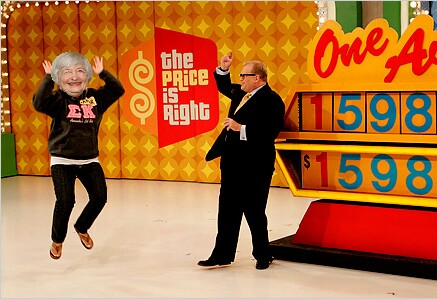Yellen in Cleveland, Ohio

- "As noted in its recent statement, the FOMC continues to anticipate that, with gradual adjustments in the stance of monetary policy, inflation will rise and stabilize at around 2 percent over the medium term."
- "Some of the recent decline in inflation, although not all, reflects idiosyncratic shifts in the prices of some items, such as the large decline in telecommunication service prices seen earlier in the year, that are unlikely to be repeated."
- "My colleagues and I currently think that this year's low inflation is probably temporary, so we continue to anticipate that inflation is likely to stabilize around 2 percent over the next few years. But our understanding of the forces driving inflation is imperfect, and we recognize that something more persistent may be responsible for the current undershooting of our longer-run objective. Accordingly, we will monitor incoming data closely and stand ready to modify our views based on what we learn."
- "Although we judge that inflation will most likely stabilize around 2 percent over the next few years, the odds that it could turn out to be noticeably different are considerable."
- "How should policy be formulated in the face of such significant uncertainties? In my view, it strengthens the case for a gradual pace of adjustments. Moving too quickly risks overadjusting policy to head off projected developments that may not come to pass. A gradual approach is particularly appropriate in light of subdued inflation and a low neutral real interest rate, which imply that the FOMC will have only limited scope to cut the federal funds rate should the economy be hit with an adverse shock. But we should also be wary of moving too gradually. Job gains continue to run well ahead of the longer-run pace we estimate would be sufficient, on average, to provide jobs for new entrants to the labor force. Thus, without further modest increases in the federal funds rate over time, there is a risk that the labor market could eventually become overheated, potentially creating an inflationary problem down the road that might be difficult to overcome without triggering a recession. Persistently easy monetary policy might also eventually lead to increased leverage and other developments, with adverse implications for financial stability. For these reasons, and given that monetary policy affects economic activity and inflation with a substantial lag, it would be imprudent to keep monetary policy on hold until inflation is back to 2 percent."
- "To conclude, standard empirical analyses support the FOMC's outlook that, with gradual adjustments in monetary policy, inflation will stabilize at around the FOMC's 2 percent objective over the next few years, accompanied by some further strengthening in labor market conditions. But the outlook is uncertain."
Luke Kawa notes that policy lag -- or some variant thereof -- appears 10 times in her speech.



